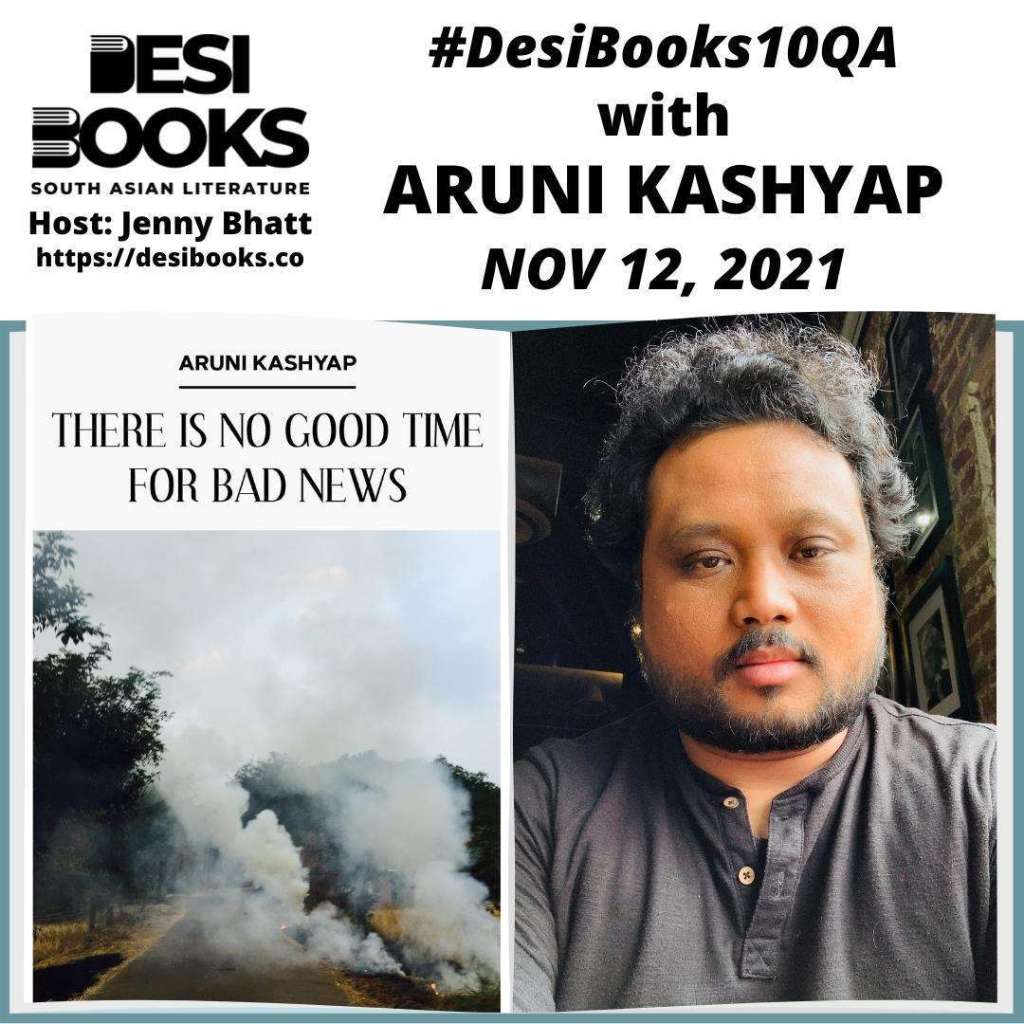
About the author
Aruni Kashyap is a writer and translator. He is the author of His Father’s Disease (a story collection) and The House With a Thousand Stories (a novel.) He has also translated from Assamese and introduced celebrated Indian writer Indira Goswami’s last work of fiction, The Bronze Sword of Thengphakhri Tehsildar. He won the Charles Wallace India Trust Scholarship for Creative Writing to the University of Edinburgh. His poetry collection, There is No Good Time for Bad News, was a finalist for the 2018 Marsh Hawk Press Poetry Prize and the 2018 Four Way Books Levis Award in Poetry. His short stories, poems, and essays have appeared in Catapult, Bitch Media, The Boston Review, Electric Literature, The Oxford Anthology of Writings from Northeast, The Kenyon Review, The New York Times, The Guardian UK, and others. He is an Assistant Professor of Creative Writing at the University of Georgia, Athens. He also writes in Assamese and his first Assamese novel is Noikhon Etia Duroit.
About the book
There Is No Good Time for Bad News opens in a country ravaged by prolonged political conflict. Told in the voices of survivors, it introduces the reader to a wide array of characters: the local police precinct summons a woman after three decades to identify the body of her insurgent son among recovered dead bodies; a soldier lives through nightmares about the war he fought forty years ago; a woman writes a letter to her insurgent lover; and an ordinary citizen, through an open letter, challenges the child-killing insurgents to kill her. At once vignettes and urgent pleas, these are stories as much as they are poems. Zooming through wars, protest marches, and conflicts, they show what it means to live under the duress of prolonged violence.
Aruni Kashyap’s poetry collection, There Is No Good Time for Bad News, shows what it is to live under the duress of prolonged violence through the voices of survivors. #DesiBooks10QA @DesiBooks
Tweet
1. The desi book that made you want to be a writer (or changed your life.)
There are many but reading Indira Goswami’s The Moth-eaten Howdah of the Tusker in high school was a profoundly moving experience for me. A powerful novel set in independence India, it inspired me to write and also taught me how powerful literature can be. Around the same time, the book was adapted into a critically acclaimed movie, which further cemented the book in public memory.
2. The desi book that your own latest book is most in conversation with and why.
It’s hard to say because I was writing to an absence. I was writing to fill up the gaps left by journalism and scholarship. There are narratives and books about Assam, India, but they are often from the perspective of people who don’t belong there or by people who cater to the idea of a savage, barbaric Northeast India for easy consumption of outsiders. I wrote this book because history, literature, art, scholarship, have denied us that acknowledgement. However, this doesn’t mean that my poetry collection is going to help someone understand this very complicated region. My book will perhaps tell readers about what it means to live through violence and survive it. My poems are a slice of life. They hold the state accountable for the mess it has created in Assam. Sadly, a lot of new writing about Assam doesn’t hold the state accountable and rather absolves the state or leaves the state with a slap on the wrist. Back home, we are all victims of state failure. Without that understanding, it is impossible to understand the problems of Assam.
“It’s hard to say [which book my collection, There Is No Good Time for Bad News] is most in conversation with because I was writing to an absence […] to fill up the gaps left by journalism and scholarship.” ~Aruni Kashyap #DesiBooks10QA @DesiBooks
Tweet
3. The desi book that doesn’t exist (to your knowledge) but you’d love to read.
A big family saga about several generations, set in Assam. I would love to read such a book but it has to be plot-driven, riveting.
4. The desi book that you’re currently reading or planning to read soon.
The Nutmeg’s Curse. Because I make it a point to read all books by Amitav Ghosh.
5. The desi book that you believe should be read and known more and why.
There are thousands but I would recommend any book by Bangladeshi author, Humayun Ahmed. I really enjoy his novels. He is a wonderful storyteller.
6. What’s the best writing advice you’ve ever received?
I received it from Indira Goswami when I was nineteen years old: Write something everyday. Everything you write doesn’t have to be published. It is like riyaaz.
#WritingTip from Aruni Kashyap: “Write something everyday. Everything you write doesn’t have to be published. It is like riyaaz.” #DesiBooks10QA @DesiBooks
Tweet
7. While writing your latest book, how did you keep yourself motivated to keep going despite setbacks (if any)?
I don’t try to write poetry. I always wait for the poem to come to my mind. So there were no setbacks because I wasn’t trying and I didn’t have a timeline in mind to finish. The first poem in the collection was written in 2008 and the latest poem was written in 2018. For ten years, my heart was filled with the delight of creating this collection. It is an astonishingly beautiful feeling.
8. With this latest book, what does “literary success” mean to you?
For me, literary success has always been about having the time, space, and financial stability to write. I am extremely grateful that I have it. I am very happy and content with my writing life. Everything else—reviews, media coverage, social media love, prizes, bestsellers—are just parties, if and when they happen. I always look forward to dress up for them.
9. How have larger literary citizenship efforts or the writing community helped you with this latest book?
I think I have received a lot of support from writers who share my vision for a diverse, multilingual literary world. They are from all races and nationalities but we all believe in the same kind of world.
10. What would you most like readers to take away from this latest book?
That people are interesting, fascinating. That most stories are about love.
“That people are interesting, fascinating. That most stories are about love.” ~Aruni Kashyap on possible reader takeaways from his poetry collection, There Is No Good Time for Bad News #DesiBooks10QA @DesiBooks
Tweet
Aruni Kashyap’s There Is No Good Time for Bad News, a poetry collection, is out now. More at his website.
NOTE: If you like the work being done at Desi Books, you can leave some appreciative feedback and sign up for the free, weekly newsletter. And please share this with other readers who might be interested. Remember: A Rising Tide Lifts All Boats.™
Join the Conversation
